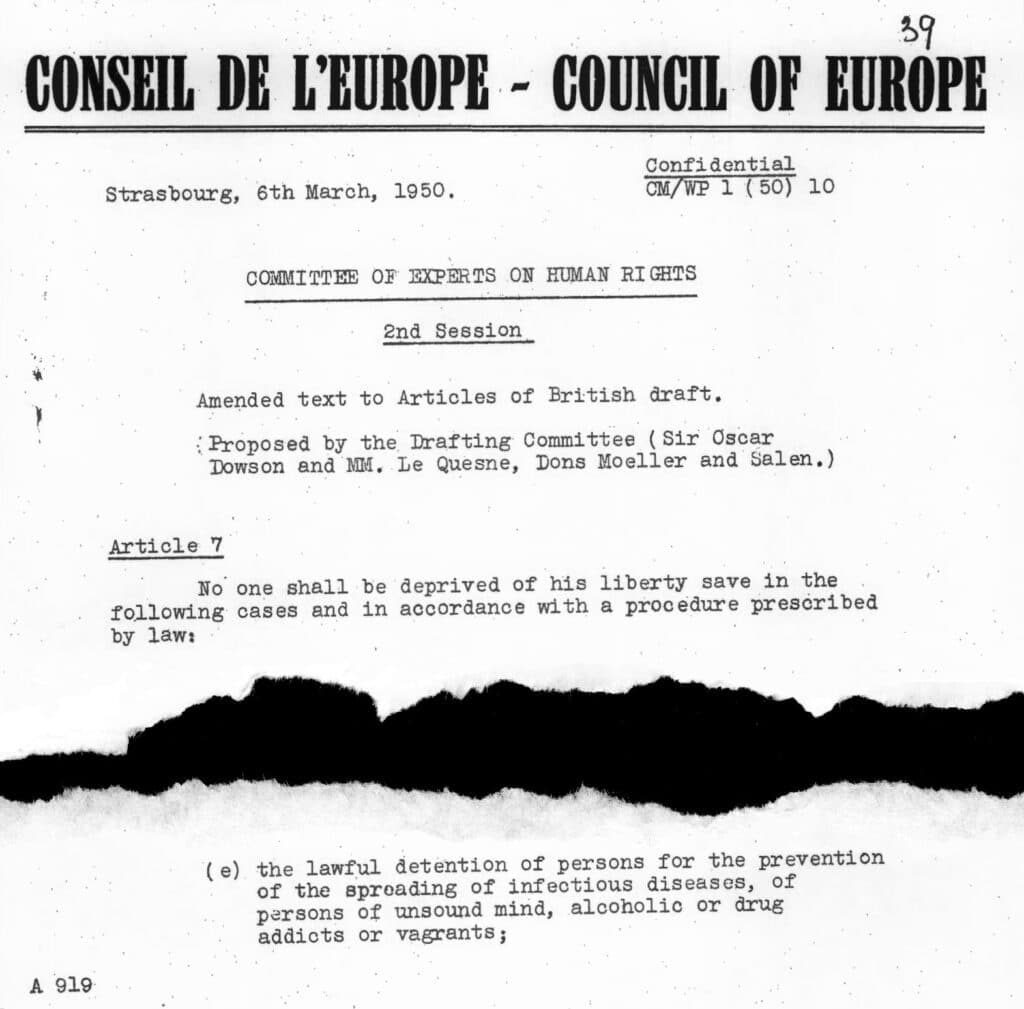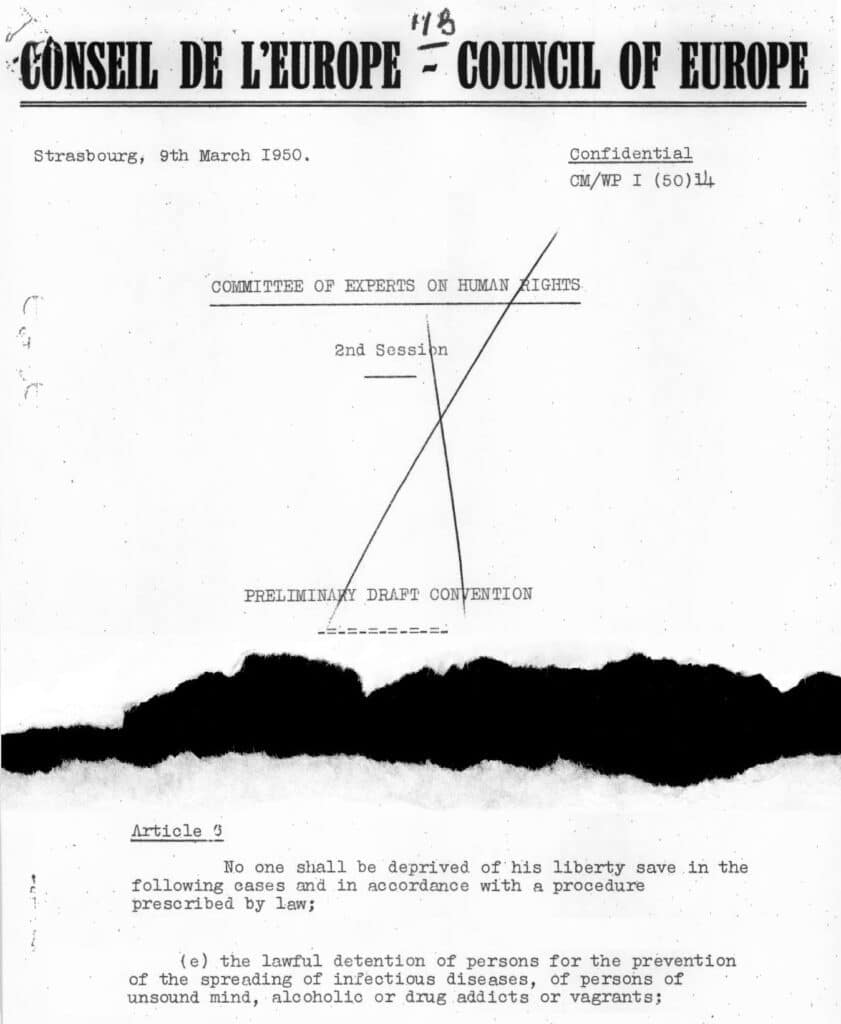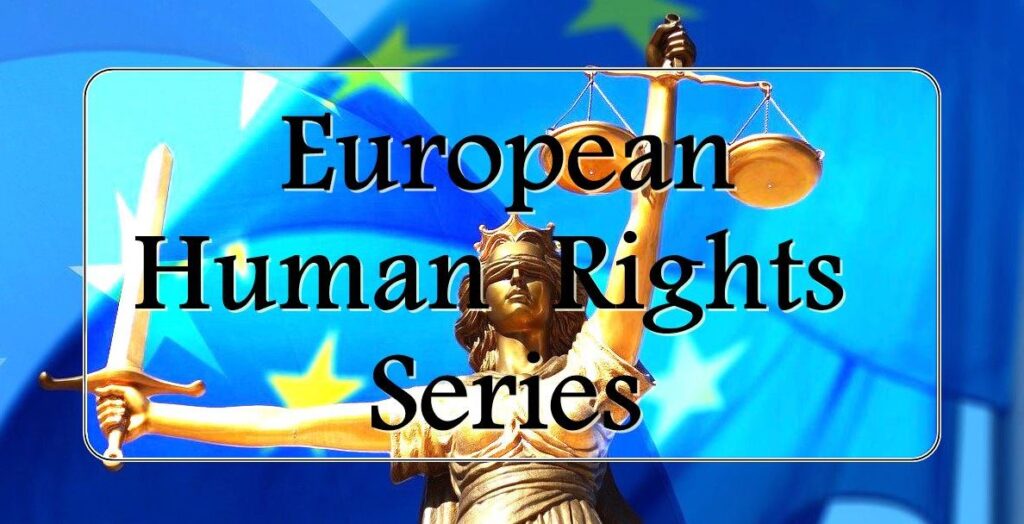The European Convention on Human Rights was drafted by groups and experts within the forming Council of Europe in 1949-1950, based on an earlier draft produced by the European Movement.
After extensive debates, the Council of Europe’s Assembly sent its proposal for a Human Rights Charter, that had been drafted by more than 100 parliamentarians in the summer of 1949, to the Council’s decision-making body, the Committee of Ministers.
The drafts of the European Movement, by which the Consultative Assembly of the Council of Europe was considerably influenced provided for the guarantee of “freedom from arbitrary arrest, detention and exile, and other measures, in accordance with Articles 9, 10 and 11 of the United Nations’ Universal Declaration on Human Rights.”
This text did not give rise to any discussion in the Assembly and was reproduced without alteration in the Assembly’s Recommendation of 8th September 1949.
Committee of Experts draft new Convention text
The Committee of Ministers of the Council of Europe met in November 1949, and after a review refused to accept the draft Convention prepared by the Assembly. A main concern was that the rights to be guaranteed were merely enumerated, and that the control of the restrictions on the rights was contained in general form.
The Committee of Ministers then called for the establishment of a committee of legal experts to draw up a draft Convention which would serve as a basis for future discussion. They provided the Assembly’s Recommendation for a Human Rights Charter to the newly established Committee of Experts on Human Rights. The Committee was given the task of determining whether the rights should be more precisely defined, for example to put them in alignment with existing legislation and conditions, or left as general statements of principles.
The Committee of Experts’ mandate stated that: “due attention should be paid to the progress which has been achieved in this matter by the competent organs of the United Nations”.
The draft international Covenant on Human Rights prepared by the United Nations Commission on Human Rights in mid-1949, included an article on the security of person, that stated:
“1. No one shall be subjected to arbitrary arrest or detention.
2. No one shall be deprived of his liberty except on such grounds and in accordance with such procedure as established by law.“
The Committee of Experts proceeded in the direction of a reduction of the rights into positive-law formulations which seems to have served the purpose of safeguarding the interests of the state rather than the interests of the individual. The state was to enjoy legal security against other states, this was the overriding viewpoint.
The Council of Europe’s Committee of Experts on Human Rights was provided “comments of the Government of the United Kingdom received by the Secretary-General” on the 4th January 1950. In these comments the UK Government among others suggested amendments of the article on security of person limiting it for certain persons. They laid this out as, “the lawful detention of persons of unsound mind or of minors, by lawful order, for the purpose of educational surveillance.”
The UK government had already been party to a submission with the same content to the United Nations Commission on Human Rights in regards to the draft of mid-1949 of the International Covenant on Human Rights. It was based on a concern that the drafted human rights text sought to implement Universal human rights including for persons with mentally disorders (psychosocial disabilities), which conflicted with legislation and social policy in place in the UK and other countries.
At its first meeting held in February 1950, the Committee of Experts on Human Rights considered proposals initiated by several of its members. The Swedish member, Judge Torsten Salén pointed out that it should be possible for the state to take “necessary measures” to fight vagrancy and alcoholism.
Sir Oscar Dowson (United Kingdom) repeated the proposal of his government specifically the article on liberty and security of person mainly aimed at mentally disordered persons (in other words persons with psychosocial disabilities).
The preliminary draft Convention ultimately agreed upon by the Committee of Experts at the end of its first meeting repeated word for word the articles of the Universal Declaration on rights to life and that: “No one shall be subjected to arbitrary arrest, detention or exile.”
The British following this provided a new amendment with a slight textual change, but with the same content as their earlier proposal, for the next meeting of the Drafting Committee. The Committee consisted of Sir Oscar Dowson (who submitted the proposal), Mr. Martin Le Quesne (a diplomat from the Foreign Service of the United Kingdom), Mr. Birger Dons-Møller (a diplomat of the Ministry of Foreign Affairs of Denmark) and Judge Torsten Salén (Sweden).
This time the Committee of four members – two of which were from the UK, one from Denmark (who had supported the original UK proposal) and the one from Sweden – included both the by UK and Sweden proposed amendments in to the Convention. With this amendment the article on security of person singled out “persons of unsound mind, alcoholic or drug addicts or vagrants” from the general population.

Finalization of Convention
The draft Convention finally submitted to the Committee of Ministers by the Committee of Experts contained two Articles corresponding to the present Article 5, on liberty and security of person.

This draft Convention was reviewed by a Conference of Senior Officials, that met in June 1950. They had lots of issues to discuss, but for unknown reasons did not revert the text of the article on liberty and security of persons. The Report and the draft Convention adopted by the Conference of Senior Officials were laid before the Committee of Ministers of the Council of Europe in August 1950. On 7th August 1950, the Committee of Ministers agreed upon the drafted “Convention of Protection of Human Rights and Fundamental Freedoms.”
On 3rd November 1950, a Committee of Legal Experts examined the text of the Convention for the last time and introduced a number of corrections of form and translation. On that occasion, Article 5 was subjected to a few slight emendations, none of which relate to the specific exemptions of “persons of unsound mind, alcoholic or drug addicts or vagrants.” The Convention thus received its final form. The European Convention of Human Rights was signed the following day.
European Convention authorize deprivation of liberty on the ground of “insanity”
The Convention’s Article 5 on the right to liberty and security of person through the work of the Representatives of the United Kingdom, Denmark and Sweden, as directed by their seniors in their Ministries of Foreign Affairs, thus came to include specific language permitting the lawful detention of the very wide and undefined concept of “persons of unsound mind” solely on the ground that they are having or believed to have psychosocial disabilities. In other words, it is written in to the European Convention on Human Rights that psychiatric involuntary commitments and furthermore that deprivations of liberty of alcoholics and vagrants are in accordance with the European human rights standard as long as these are done based on a national law.
This paragraph of the Convention has not been amended since, and is still in force.








